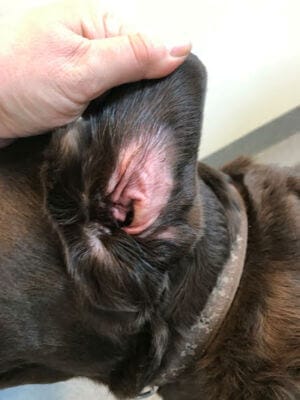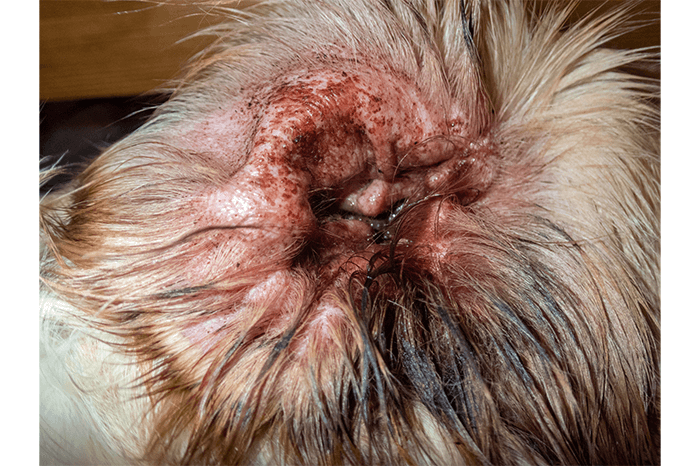Why does your dog keep itching its ears?
Marina G VeterinarianItchy ears is not only extremely bothersome, it can really affect your dog’s quality of life, spending a lot of time scratching an itch or trying to relieving its pain. Finding the cause and the appropriate treatment is really important to bring them relief as soon as possible.
Does your dog keep scratching its ears a lot lately? Every dog will scratch its ears every once in a while, but if this is something that you’re seeing regularly, it’s time to take your pet to the vet and investigate. As there are several problems that can cause your dog’s ears to feel itchy, it is very important to find out what is causing this and start appropriate treatment.
Common signs of itchy ears in dogs
Scratching the ears is usually the most common sign of itchy ears in dogs. However, if the ears are sore, your dog may try to find a gentler way to relieve its itchiness, such as:
- Shaking its head,
- Rubbing its head on the floor or against objects,
- Pawing at its ears.
If you don’t see your dog scratching but suspect it may have itchy ears, have a closer look. If you find bald patches at the base of the ear, with redness, scabs and wounds, this means that your dog has been scratching. Also, if you notice redness, excess earwax, or any kind of discharge inside the ear, this is likely to cause itchiness and discomfort as well.
Lowered ears and whimpering while scratching or when someone touches its ears are also signs of discomfort that can suggest an ear problem.
Painful ears are a common result of secondary infections, which are often associated with itchy ears. If your dog’s ears are sore, it may avoid being petted on the head and even show aggressiveness towards you if you try to do it.
If its ears are making your dog extremely uncomfortable, he/she may show a lack of appetite, seem less interested in the surrounding environment and withdraw from social interactions with other pets and people.
What does cause dog’s itchy ears?
There are a number of conditions that can cause itchy ears in dogs, from uncomplicated one-time infections to chronic illnesses that manifest through ear problems, the most common being:
Allergies
Allergies in dogs can be incredibly common and can cause a range of symptoms. Food allergies and atopic dermatitis often present with intense itchiness in dogs, with the ears often affected. This usually results in ear infections.
Common signs of allergies include:
- Localised or generalised itchiness,
- Skin lesions (inflammation, wounds, scabs, infection)
- Vomiting and diarrhoea are possible in the case of food allergies but not very common,
- Sneezing and runny eyes may be present in dogs with atopic dermatitis.
Even though these signs may be suggestive of allergies, diagnosing what causes allergic disease usually takes time, patience, and a number of visits to the vet. Also, allergic dogs can suffer from more than one type of allergy, which can make the diagnostic process more challenging.
Ear infections (otitis)
Did you know that there’s a healthy population of microorganisms that live on your pet’s ears?
These bacteria and yeasts are usually harmless, but if there’s something that disturbs the ear environment, such as inflammation, irritation, or scratching as the result of allergies, parasites or foreign bodies, for example, they can start to multiply without control, causing a secondary infection.
Ear infections are usually very painful. As local treatment requires manipulating the ears often, with several cleanings and topical treatment applications during several days, your dog can react aggressively when you are touching their ears due to pain. This can happen even if your dog has never growled or bitten anyone before.
When treating ear infections, make sure to approach your pet with caution and keep an eye on their body language. For more tips on how to clean your dog’s ears, don’t hesitate to read our dedicated page.
Foreign bodies
A foreign body is what we call something that has entered the ear and that has not managed to come back out.
This type of problem is very common during spring and summer with grass seeds, for example. Due to their structure, grass seeds easily stick to your dog’s hair, and their arrow-like shape allows them to penetrate into the tissues.
If a grass seed enters the ear canal, it can cause extreme discomfort and itchiness to your dog, who will scratch, shake their head and do whatever they can to try and remove it. It’s not likely that your pet can remove the grass seed by themselves, though, and secondary infections are likely to develop. Veterinary intervention to remove the foreign body is almost always necessary.
Ear mites
Fortunately, ear mites are not very common in dogs, but they can catch them if they’ve been in contact with affected animals.
Ear mites are microscopic parasites that will settle in the ear canal. These are not usually visible to the naked eye, but they may be seen with the help of an otoscope. If not, your vet may need to examine a swab from your dog’s ear under the microscope to identify them.
An ear mite infection is extremely itchy for dogs, causing inflammation and a characteristic dark ear discharge that resembles ground coffee.
Which dogs suffer from itchy ears?
All dogs can have itchy ears, but there are some breeds that are predisposed to the underlying conditions we’ve talked about, such as:
- Allergies – e.g., Labrador and Golden Retrievers, German Shepherds, French Bulldogs and Pugs
- Ear infections (due to the shape of their ears) – e.g., Cocker Spaniels, and Basset Hounds
- Other skin diseases that can lead to ear infections – breeds will vary depending on the disease.
When should you take your dog to the vet?
Ear problems of any kind should be assessed by a vet to avoid evolving into more serious problems. Due to the ear’s anatomy, a simple ear infection, for example, can progress to meningitis, so you should never take ear problems lightly.
That said, if you recognise any sign of an ear problem, we recommend booking an appointment with your vet.
What can you do if your dog’s ears are itchy?
If you find your dog constantly scratching its ears, you should book an appointment with your vet as soon as possible.
Ear problems are usually painful, causing a negative impact on your dog’s quality of life, and can lead to permanent damage to their hearing, as well as neurologic problems, if not treated properly.
How to treat your dog’s itchy ears
Treatment is usually based on 3 key aspects, but it varies depending on what is causing the ears to itch. Always use auricular products as instructed by your vet.
- Ear cleaning
Ear cleaning will help remove discharge, earwax, and debris, allowing the topical products to reach the place they are needed, and reduce inflammation.
For more information on how to clean ears, check our dedicated page. - Topical ear treatment
Topical treatment usually involves putting medicine inside your pet’s ear canal. This medicine will vary depending on what’s needed to treat your pet’s ear problem. It can include antibacterial (to kill bacteria), anti-inflammatory (to reduce pain and inflammation), anti-fungal (to kill yeasts) and acaricidal (to kill mites) agents. - Treatment of the underlying cause
Treating the underlying cause is essential to prevent future ear infections.
How to prevent itchy ears?
Some dogs who have itchy ears also have an underlying problem.
If your dog has a chronic condition that predisposes them to itchy ears, such as atopic dermatitis, the only way to prevent itchy ears is to have that condition treated. If your dog has recurring ear infections, it’s vital to find the cause.
As for ear mites, your pet’s regular parasite treatments may help with that, depending on which product you’re using.
After walks, have a thorough look through your pet’s body to see if you can find any grass seeds that can get into the ear canal and remove these if you do.
















